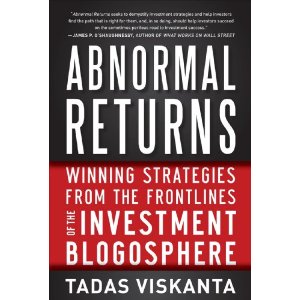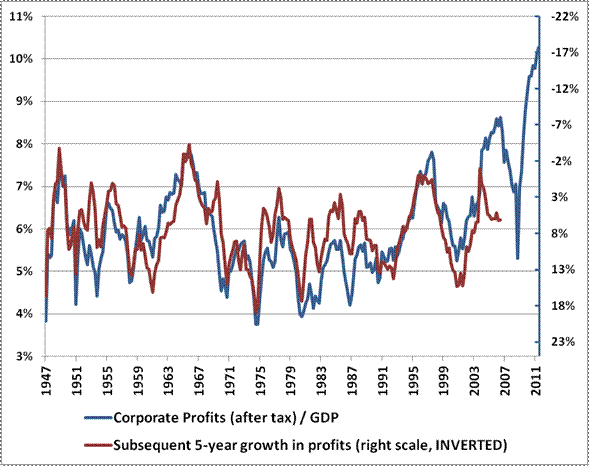Tadas Viskanta’s Abnormal Returns provides an invaluable daily service to anyone following markets and investing. A while back, Tadas ran a desert island quiz asking a bunch of independent bloggers, “If you could only read one blog, not Abnormal Returns, what would it be?” His wording was appropriate, since everyone was naming only their second choice after AR.
Tadas is a master link curator on AR, but he also rolls long form. His new book is now available on Kindle and will be released soon in hardback: Abnormal Returns: Winning Strategies from the Frontlines of the Investment Blogosphere
I had the chance to ask Tadas some questions about how he builds his daily linkfests, other web filtering efforts, the development of the financial blogosphere, and his new book. Below our Q&A, I’ve embedded the introduction and first chapter of Tadas’ book (click on the full screen icon to read it more easily).
Mick: What are the most important tools/sources you use to build your linkfests?
Tadas: Whenever somebody asks what I read on a daily basis I usually say “everything.” Twitter and StockTwits have become the hub through which I get fodder for the blog. It would be tough, but I think I could do the linkfest with no other tools. That said, I receive some info still by e-mail and if I have time I still visit some sites directly. The other integral tool I use is my RSS feeds where I catch stuff I may have missed in other places.
M: Everyone loves receiving a AR link. To merit inclusion in AR, what exactly are you looking for?
T: I have never claimed that Abnormal Returns was anything more than what one guy thinks is interesting. Abnormal Returns isn’t really a news site, per se. There is simply too much going on for any single site to cover. What I am looking for analysis and commentary that will stand up over the next few days, at least. I would say that the daily linkfest gets half its traffic the day after it is posted. So the material therein needs to have some sort of half life. In the end the best posts are interesting, novel and hopefully unexpected.
M: Do you first make sure to read the proven bloggers/sites, and only then move on to tier two or tier three sources if you have time… or do you always see everything and try to reset the playing field regularly?
T: I always try to see everything. It’s not always possible, but that is what I try to do. You don’t really know how things will shape up until you get a glance at everything.
 M: How do you find talented new bloggers?
M: How do you find talented new bloggers?
T: They find me in some form or fashion. In my book I describe the investment blogosphere as an “imperfect meritocracy.” The best bloggers eventually bubble up on to my and other blogger’s radar screens. I am somewhat reluctant to quickly endorse new bloggers until they show a commitment to it. I have seen a lot of bloggers come out of the gate strong to only peter out.
M: What are the challenges of summarizing a complex article in just one sentence?
T: Summarizing an article takes practice. Having done thousands of linkfests I have gotten pretty good at it. If I wanted to I could probably be a pretty good Business Insider headline writer. If I can’t summarize something neatly, I try and grab a quote just so I don’t mangle the author’s thoughts.
M: As a fundamental investor, how do you view technical analysis and TA bloggers?
T: In a post last year I noted the importance to me of Jack Schwager’s Market Wizard book(s). The reason being that it showed that traders/investors can make money in very different ways, including technical analysis. The challenge for the blog is that there is so much of it that it is difficult to get your hands around. Therefore TA with a macro focus or an educational touch is more likely to make its way into the linkfest.
M: What are the major trends you’ve seen in finance/market blogging since you began AR?
T: I think the biggest trend is the professionalization of blogging. The mainstream media has caught onto the blog format and have embraced it to a large degree. This sort of platform allows them to post… a lot. And as we all know that frequency of posts is a big indicator of blog traffic. That being said the blogosphere is still a vital place. New bloggers continue to enter and bring their own unique voices to things. It also helps that bloggers and readers can take to Twitter/StockTwits to discuss things. I think it helps the process immensely.
M: We’ve seen a number of efforts to at least partially automate link curation. I’m thinking, for example, of Techmeme and Counterparties (partially automated) or News.me and TwitterTim.es (fully automated – network as the filter). As a master hand curator purist, what are your thoughts on these services?
T: No one has yet built a “TechMeme for finance.” I think TechMeme probably has the balance between automation and curation about right. As you note there is some really interesting things going on in this space, including Counterparties and StreetEye/Linkfest.com. The challenge is that the economics and finance blogospheres are really diverse. I try and hit the all of them in the linkfest, but getting the balance correct algorithmically might take some work.
M: Are there long form curators in other fields whom you admire and learn from?
T: I think it is such a personal thing, I don’t know that you can necessarily learn a whole lot from others. Like everyone else I like kottke, although he has scaled back. I really like what they do over at The Browser. On the long form side Longreads does a nice job as well. When I grow up I want to be John Gruber at Daring Fireball and just write about Apple all day.
M: Do you make your living from Abnormal Returns, or as a trader/investor?
T: Suffice it to say that Abnormal Returns is a labor of love.
M: Why did you decide to write a book, and why on this topic? How was the experience of writing such a long work after all those blog posts?
T: I had always wanted to write a book. In the introduction to my book I relate the story of how it is I came to blog and eventually write this book. The topics in the book were all pretty organic in that I had been writing about them in one form or fashion over time. I think the discipline of writing the blog really helped me when it came time to actually sit down and write the book. The two were synergistic in that oftentimes in the morning I would see something on a topic I was planning to write about. In that sense, it was all pretty fresh.
M: One chapter of your book is called ‘Smarter Media Consumption’. Can you give us a preview?
T: I talk about a number of topics in the chapter, but for most investors I think ‘less is more’ is an apt recommendation. Investors can get more out their time by reading widely and avoiding big swaths of the mainstream financial media.
M: Thanks Tadas!





